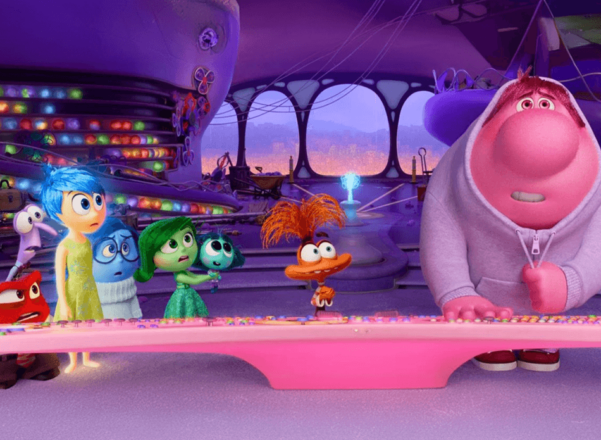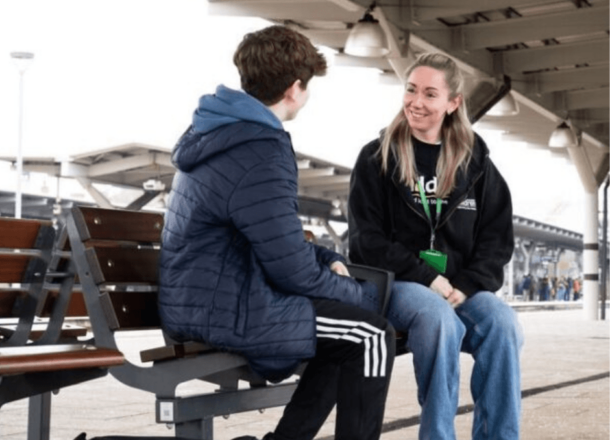What is Children’s Mental Health Week?
Children’s Mental Health Week raises awareness of the mental health challenges affecting today’s children and young people. This year, it’s taking place 3-9 February.
Launched by children’s mental health charity Place2Be, the campaign aims to “empower, equip and give a voice to every child in the UK” and, since its launch in 2015, has grown into a nationwide event.
“Know Yourself, Grow Yourself”
This year’s theme, Know Yourself, Grow Yourself, encourages children to get to know their strengths, likes and dislikes, hopes and dreams, as they learn to accept themselves for who they really are.
Place 2Be have partnered with Here4You to share advice and activities for families and schools, using the characters in Disney’s InsideOut 2 to help young people understand the importance of expressing their emotions in a healthy way

Mental health struggles among young people
Adolescence is a very formative time in a person’s life. Navigating changing expectations while growing into your own identity can make it difficult to cope with the pressures of everyday life.
Over half of 11-25-year-olds in the UK experience negative emotions which affect their day-to-day lives*. In the last decade, there’s been a 65% increase in the number of children and young people admitted to acute medical wards in England because of mental health problems**.
On top of the usual stresses of being a teen, experiencing poverty, abuse or violence can make young people more vulnerable to a range of mental health problems, including:
- Emotional disorders, such as depression and anxiety
- Behavioural disorders, such as attention deficit hyperactivity disorder (ADHD)
- Eating disorders
- Psychosis
- Self-harm
- Suicidal feelings
Putting mental health first
Mental wellbeing is at the heart of Railway Children’s work with children in the UK, India and Tanzania.
Many of the young people referred to us have had painful or traumatic experiences which have a huge impact on their mental health. The work we do with them is far from just a tick-box exercise – we work with children on both short- and long-term placements, adapting our sessions according to their preferences and needs.
Why do we focus on transport networks? Because a lot of young people use public transport after running away from difficult situations at home or school.
When a young person is referred to us, we evaluate every aspect of their lives and put together a holistic, bespoke plan to ensure they get the best possible support for their situation.
Often, this means linking them up with other charities and organisations who can help address their individual needs, such as supporting them with a specific mental health condition.

How we helped Lara heal
We met Lara, 14, when British Transport Police referred her to us after she was found trespassing on tracks. Visiting bridges or railways with the intention of harming herself had been Lara’s regular response to times of stress and upset.
Through her one-to-one sessions with Railway Children worker, Rachel, Lara started to see things differently. Lara did not want her self-harm to impact her baby niece and wanted to make sure she’d be around as her niece grew up.
“My sessions are important to Lara because they give her a chance to talk everything through,” says Rachel. “We have built up a great rapport and a trusting working relationship.”
Thanks to the coping strategies she learned with Rachel, Lara is now back in school and engaging in lessons, which has had a positive effect on her wellbeing.

“When I first started working with Lara, she had a lot of scars on her hands from self-harming,” says Rachel. “But she’s not done it for a while, and the scars are fading.”
Lara plans to join the army or police and wants to use her experiences to help other people.
Mental Health First Aiders training
We want children’s mental health to be a priority at every level of society.
To help make this dream a reality, we offer mental health training at varying levels, including:
- awareness sessions
- targeted sessions for working with young people
- Mental Health First Aiders accreditation for managers and supervisors
Designed with children and young people in mind, our Training, Development & Participation programme manager, David Bentley, uses what he learns from young people to create courses that represent their struggles and experiences. Courses cover areas such as depression, self-harm, eating disorders and bullying.
“The aim is not to diagnose, but to provide the knowledge and skills to identify a potential mental health condition, start a conversation and signpost to professional help,” says David.
Our bespoke mental health accreditation for UK rail professionals provides an understanding of mental health disorders, giving staff the tools to support potentially vulnerable children.
To sign up or find out more about the training we offer, email David: d.bentley@railwaychildren.org.uk
Together with the rail industry, children and their families, we’re helping young people understand who they are and what they need to thrive.
Get help
If you or a young person you know is struggling with their mental health, there are plenty of organisations that can help. You’ll find helpful resources and different support options on our Youth Platform.
Sources
*Young Minds, April 2023.
**Significant rise in mental health admissions for young people in last decade, UCL, January 2022.
***Name and some details changed to protect identity.